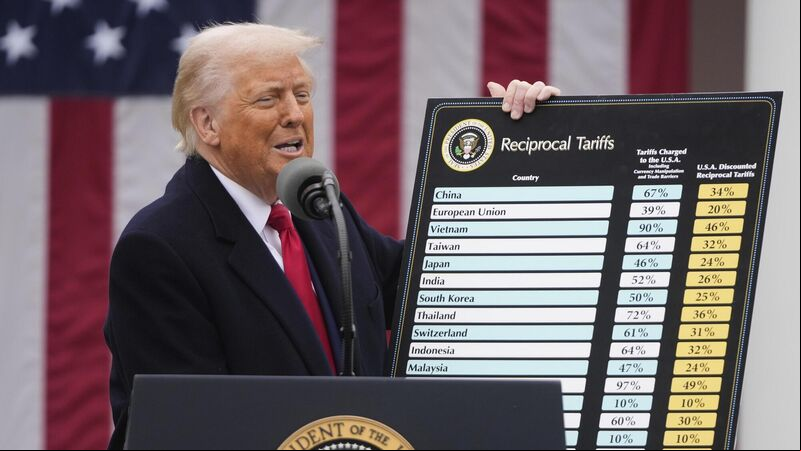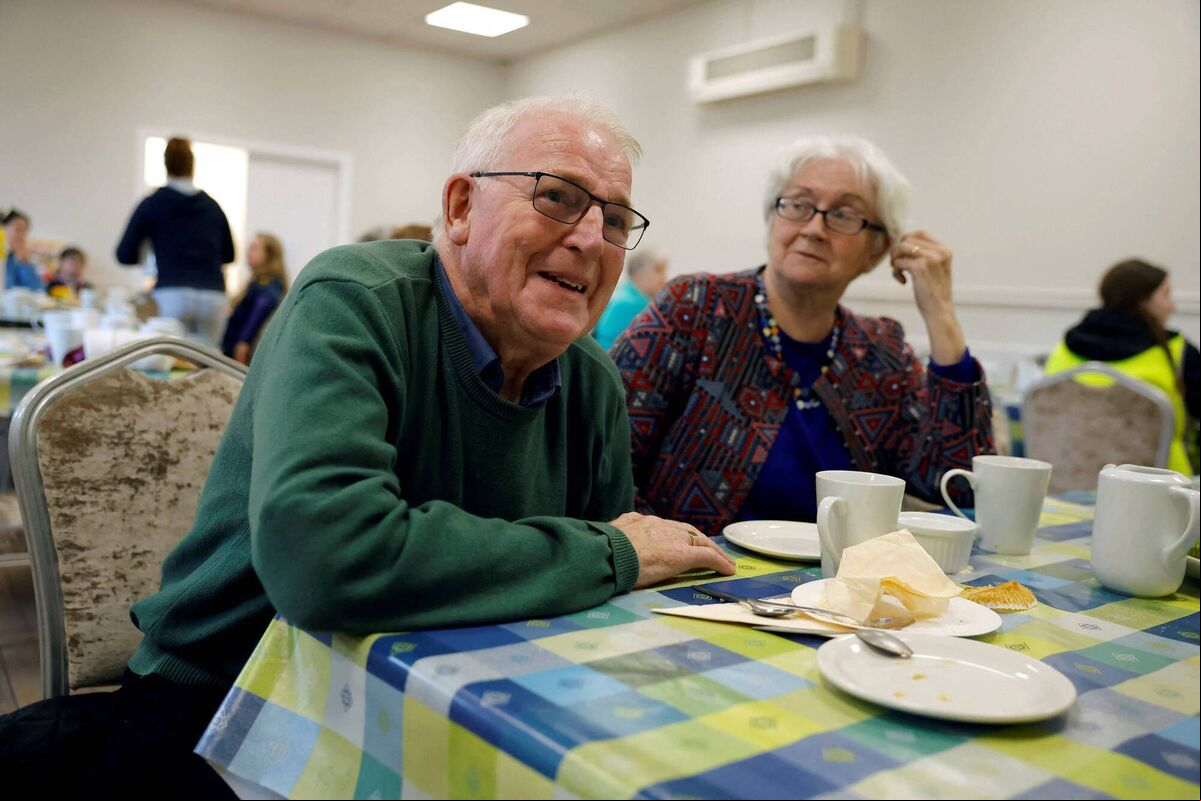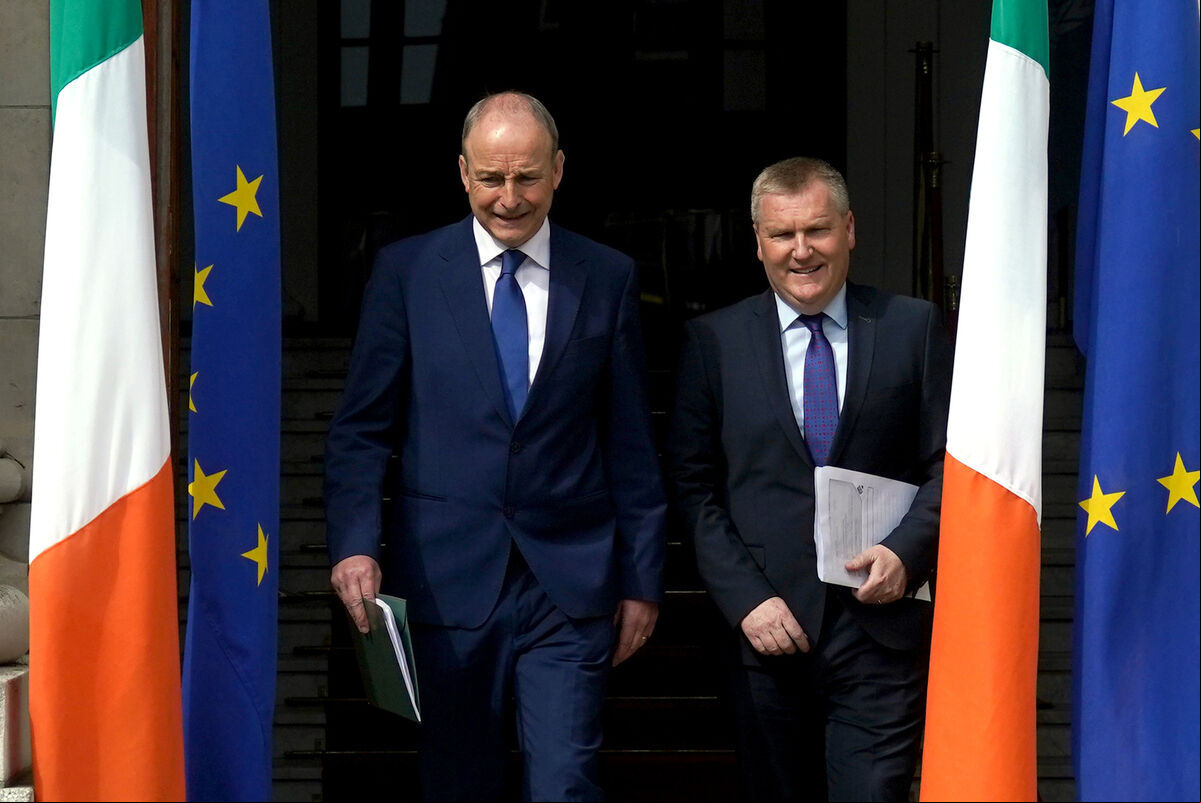Cork's Pharma sector may yet still be hit by terror of tariffs

US president Donald Trump speaks during an event to announce new tariffs in the Rose Garden at the White House on Wednesday. Picture: AP/Mark Schiefelbein.



US president Donald Trump speaks during an event to announce new tariffs in the Rose Garden at the White House on Wednesday. Picture: AP/Mark Schiefelbein.
While the pharmaceutical sector — one of the main areas of concern in Cork ahead of US president Donald Trump’s tariff announcement — will not be affected by tariffs for now, there is concern that they may be coming down the line.
On Wednesday, Mr Trump announced a 20% tax on goods from the EU, but further information published by the White House suggests some goods — including pharmaceuticals — “will not be subject” to the tariffs.
However, the industry may be subjected to harsh tariffs at a later date.
In Cork, 33 pharma or medical devices companies, including Eli Lilly, Johnson and Johnson and Merck, employ almost 14,000 people in total.
Huge employer
Fine Gael county councillor for Cobh, Anthony Barry, told The Echo that pharma is a huge employer in areas such as Little Island and Carrigtwohill within his local authority municipal district.
“It’s been flagged that a lot of products made here aren’t final products, they’re going to the States where added value will be put on them.
“The level of technology and time taken to develop these industries in Ireland means you’re not just going to close them down, build one in Indiana and it will all be fine and hunky dory next year,” said Mr Barry.
“Looking at the supply chain, and the fact that we’re talking about medicines here, maybe issues around that logic dictated the decision not to put tariffs on this sector at the moment.
“It’s temporary though, he’s definitely thinking up something, because he is mentioning Ireland with regularity, but hopefully this is buying a bit of time,” he added.
Concerns
Cork Chamber CEO Conor Healy said that concerns still remain around the pharmaceutical sector.
“I think, based on where we were before the announcement in the unknown, there’s wide-ranging relief that pharma is not included,” said Mr Healy.
“But there’s speculation that at some point in the future a sectoral tariff on pharma could be introduced, so there’s some level of concern there still.”
Independent Ireland leader and Cork South West TD, Michael Collins, said: “While the situation is serious, Ireland has — for now — escaped the worst of the tariff measures, with the vital pharmaceutical sector currently untouched.
“So far, we’ve come out of this relatively lightly. That’s no comfort to those sectors impacted, but it does mean we still have room to negotiate.”
As Mr Trump takes aim at the mostly American-owned pharmaceutical industry here, many people in Carrigtwohill are getting nervous.
A cluster of high-tech plants offering well-paid jobs has transformed the East Cork town, quadrupling its population in just two decades.
The pharmaceutical industry has an outsized presence in Ireland, employing about 2% of the workforce and generating tens of billions of euro in taxes for Government coffers.
But if Mr Trump has his way, the good times could be about to end. While pharmaceuticals were exempt from the sweeping duties he announced on Wednesday, a US official said the president is planning separate tariffs targeting the pharma industry.
Pharmaceuticals ed for €58bn of the €73bn worth of products Ireland exported to the United States last year, a big contributor to the US goods trade deficit with the EU that has riled Mr Trump.
Worrying
“He is going to do fierce damage,” said retired butcher Anthony Barry, 73, at a charity event at Carrigtwohill’s community centre, where the tariff threat to the economy dominated conversation.

“It’s just a worrying time,” he said, after one of the event’s organisers listed six family who work at nearby US pharmaceutical facilities.
Mr Trump has repeatedly singled out Ireland for “luring away” US pharma giants such as Johnson & Johnson and Pfizer with decades of low corporate tax rates.
US commerce secretary Howard Lutnick has characterised Irish policy as a “scam” that Mr Trump’s istration will end through tax changes and tariffs.
More than a dozen of the world’s biggest drugmakers have plants in Ireland, some decades-old. Many make medicines or active ingredients for the $630bn US market, the industry’s biggest.
Merck produces the world’s top-selling prescription medicine — Keytruda, for cancer — near Dublin. AbbVie makes Botox shots in Westport, while Eli Lilly’s Kinsale site helps meet soaring US demand for obesity drugs.
Mr Trump’s demands to shift manufacturing to the United States have prompted several companies to ramp up investment there. But industry sources have told Reuters that drug makers are reluctant to break and rebuild global supply chains, of which Ireland is a linchpin, as doing so would be costly and complex.
Lack of certainty
“I wouldn’t see an exodus happening as a result of this, because of not just the track record [of pharma in Ireland] but the lack of certainty around what the alternative is,” said PwC Ireland’s lead advisor to pharmaceutical clients Harry Harrison.
While some were carrying out “very, very initial” scenario-planning around moving production, including the cost, tax, and regulatory implications and supply chain impact, Mr Harrison said: “I would expect to see largely what is here now remain here”.
Investment agency IDA Ireland has announced at least a dozen US pharma investments of between $55m and $1.8bn since mid-2022, and its head of life sciences, Rachel Shelly, said there was no sign they would be paused.
Although Taoiseach Micheál Martin warned on Tuesday that further investment decisions are on hold, Ms Shelly said: “In the immediate term, the uncertainty may cause companies to hold a little bit, but those decisions can’t be put off forever.”
While foreign multinationals have long cut their tax bills by locating intellectual property (IP) in Ireland, the revenues that have rolled in have left the country with the healthiest public finances in Europe.
Vulnerable
But the reliance on decisions made in US boardrooms has left it especially vulnerable to Mr Trump’s economic plans. Mr Martin has called it the most serious challenge facing the country.
Speaking to reporters outside Government Buildings, Mr Martin warned the imposition of tariffs on a worldwide scale could cause recessionary trends across the globe.

The Taoiseach said he is concerned about the impact on investments and jobs in Ireland, the EU, and across the world, saying investors will keep their head “below the parapet” until the fallout over US tariffs settles down.
The Fianna Fáil leader said he “deeply regrets” the decision by Mr Trump to impose the tariffs, saying there is “no justification” for them.
He disputed the figures cited by the US to justify the imposition of tariffs, saying they “do not reflect the reality of the situation as we see it”.
Mr Martin said that Ireland and the EU will “weather this storm” in the face of US tariffs, but said they will have an adverse impact.
He said the next step will be negotiations.
Asked whether he believes Ireland could survive a recession, Mr Martin said: “I think we have to see how that plays out over the next while.
Real problem
“The real problem is, though, the imposition of tariffs on such a wide scale and at a high level across the world will have a dampening effect on investment, and that in itself could create recessionary sort of trends across the world.
“I’m worried more about the global impact of this and the impact on investments, the pausing of investments, perhaps, and investors generally, keeping the head below the parapet until this settles down.
“That is a problem. Sentiment matters. Psychology matters. Businesspeople and investors want certainty, stability, predictability.
“They don’t have that at the moment, and that’s my overarching concern.”
The impact was likened to the Great Depression by Public Expenditure Minister Jack Chambers.
He said: “The last time the scope or extent that this was tried globally in trading was… around 1930, which led to the Great Depression. In fact, the tariffs that are being imposed now are in excess of that.”
Mr Martin was among senior Government figures to suggest the tariffs were an opening bid for negotiations.
He said: “The so far from the US is, our sense is, that negotiations is the preferred route forward.
“The next 48 hours will tell a lot.
“What I get from the president’s speech is very much sort of wanting to engage, and signalling a desire to engage, to negotiate a sensible settlement here.”
Strategy
He also said the EU and Ireland will “not be shy” in advocating for their interests as part of negotiations.
“No country is going to be shy and Ireland will not be shy in saying, in of our interests, but also strategy,” he said.
“I think the strategy is the key issue here, in of deg counter-measures that would have the desired impact of bringing people to the table and enabling negotiations.”
Mr Lutnick, a vocal critic of Ireland, said Mr Trump “is not going to back off” on the tariffs, which he described as a reordering of global trade.
Mr Lutnick told CNN the US president would only make a new deal with affected countries if they “change everything about themselves”, in a reference to tariffs and “non-tariff trade barriers” – in particular VAT.
Ireland’s European Commissioner Michael McGrath, who also attended a press conference in Dublin alongside Mr Martin, said the EU is ready to negotiate with the US.
Keep up-to-date with the top stories in Cork with our daily newsletter straight to your inbox.
Please click here for our privacy statement.
25 seconds ago
Bere Island Project Group under threat due to lack of funding4 hours ago
Cork v Limerick: Three reasons the Rebels are Munster champions4 hours ago
Cork hurling fans kept the faith and this team delivered a Munster title victory for the ages2 minutes ago
Cork v Limerick: Rebels triumph on penalties to take Munster titleHave you ed your FREE  App?
App?

It's all about Cork!
7 hours ago
Carer who died in house fire was a 'son, brother, partner, friend and rock'8 hours ago
Principal says sudden deportation of two pupils felt like a death in Dublin school9 hours ago
Man who attacked victim after being invited to house for food jailed for six years9 hours ago
'Putin shouldn't have a veto': TD says triple lock debate must avoid misinformationAdd Echolive.ie to your home screen - easy access to Cork news, views, sport and more